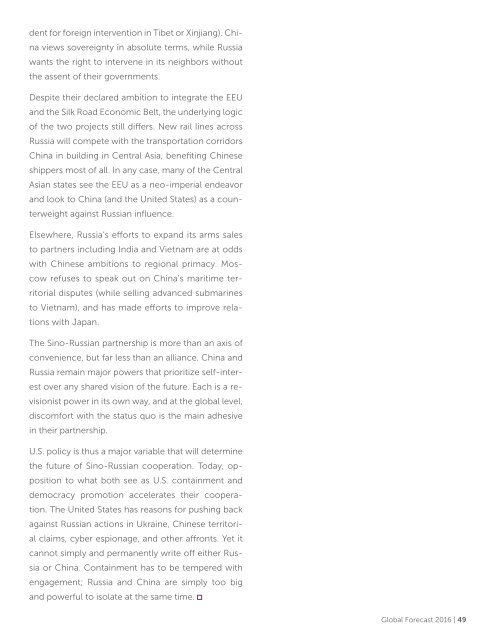You also want an ePaper? Increase the reach of your titles
YUMPU automatically turns print PDFs into web optimized ePapers that Google loves.
dent for foreign intervention in Tibet or Xinjiang). China<br />
views sovereignty in absolute terms, while Russia<br />
wants the right to intervene in its neighbors without<br />
the assent of their governments.<br />
Despite their declared ambition to integrate the EEU<br />
and the Silk Road Economic Belt, the underlying logic<br />
of the two projects still differs. New rail lines across<br />
Russia will compete with the transportation corridors<br />
China in building in Central Asia, benefiting Chinese<br />
shippers most of all. In any case, many of the Central<br />
Asian states see the EEU as a neo-imperial endeavor<br />
and look to China (and the United States) as a counterweight<br />
against Russian influence.<br />
Elsewhere, Russia’s efforts to expand its arms sales<br />
to partners including India and Vietnam are at odds<br />
with Chinese ambitions to regional primacy. Moscow<br />
refuses to speak out on China’s maritime territorial<br />
disputes (while selling advanced submarines<br />
to Vietnam), and has made efforts to improve relations<br />
with Japan.<br />
The Sino-Russian partnership is more than an axis of<br />
convenience, but far less than an alliance. China and<br />
Russia remain major powers that prioritize self-interest<br />
over any shared vision of the future. Each is a revisionist<br />
power in its own way, and at the global level,<br />
discomfort with the status quo is the main adhesive<br />
in their partnership.<br />
U.S. policy is thus a major variable that will determine<br />
the future of Sino-Russian cooperation. Today, opposition<br />
to what both see as U.S. containment and<br />
democracy promotion accelerates their cooperation.<br />
The United States has reasons for pushing back<br />
against Russian actions in Ukraine, Chinese territorial<br />
claims, cyber espionage, and other affronts. Yet it<br />
cannot simply and permanently write off either Russia<br />
or China. Containment has to be tempered with<br />
engagement; Russia and China are simply too big<br />
and powerful to isolate at the same time.<br />
Global Forecast 2016 | 49


